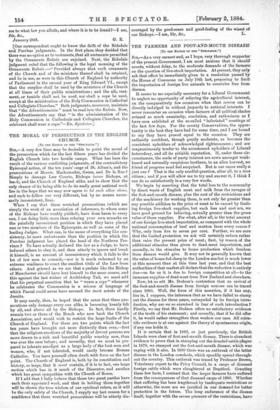THE MORAL OF PERSECUTION IN THE ENGLISH CHURCH.
LTO THE EDITOR OF THE "SPECTATOR"]
SIR,—A. very few lines may be desirable to point the moral of the persecution which for the last fifteen years has divided the English Church into two hostile camps. What has been the result of the various conflicting judgments, of the contradictory Episcopal action, of the ten years' siege of St. Alban's, and the prosecutions of Messrs. Mackonochie, Green, and De la Rue ? -Simply to damage Law Courts, Bishops (some Bishops, at leak.t), and the Church of England alike, and to show that the only chance of its being able to do its really great national work lies in the hope that we may now agree to let each other alone, and each to follow our very different, but by no means neces- sarily inconsistent, lines.
When I say that these wretched prosecutions (which are simply the work of an association of informers, to whom some of the Bishops have weakly yielded), have done harm to every one, I am doing little more than echoing your own remarks on the painfully inconsistent position in which they have placed one or two members of the Episcopate, as well as some of the leading Judges. What can, in the name of everything like con- sistency, be more unfortunate than the position in which the Parches judgment has placed the head of the Northern Pro- vince P To have actually declared the law as a Judge, to have induced others to obey it, and then utterly to ignore and break it himself, is an amount of inconsistency which it falls to the lot of few men to commit,—nor is it much redeemed by an extreme readiness to exact the smallest tittle of the Law from others. And grieved as we are that a prelate like the Bishop of Manchester should have lent himself to the same course, and this against the last wishes of Archbishop Tait, we must add that his perpetual assertion that he "wears a cope" whenever be celebrates the Communion is a misuse of language of which Pascal could never have accused the most astute of the Jesuits.
It may surely, then, be hoped that the sense that these pro- secutions only damage every one alike, is becoming keenly felt by all, and above all by the Bishops. In fact, there hardly remain two or three of the Bench who now back the Church Association, and would wish to restrict the large limits of the Church of England. For there are two points which the last ten years have brought out more distinctly than ever,—first that the religious emotions of the majority of devout persons are more drawn to a rich and beautiful public worship now, than was ever the case before ; and secondly, that we must be pre- pared to tolerate amongst us a large body of the best men and women, who, if not tolerated, would easily become Roman Catholics. You have yourself often dwelt with force on the last point. The Church of England is, both by its constitution and history, so large, that it must contain, if it is to last, one large section which has in it much of the Dissenter, and another which has great sympathies with the Church of Rome.
If I add that I fully believe that these two great parties have each their appointed work, and that in holding them together will be shown the true wisdom of our spiritual rulers, as it will Ise the only safety of the Church, I supply my last reason for a confidence that these wretched prosecutions will be utterly dis-
couraged by the good-sense and good-feeling of the wisest of


































 Previous page
Previous page